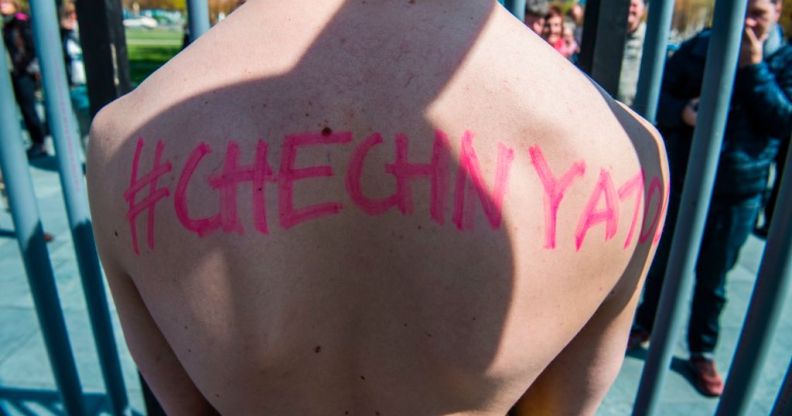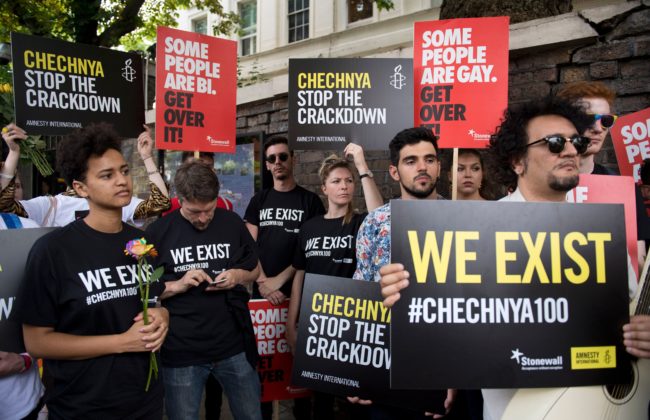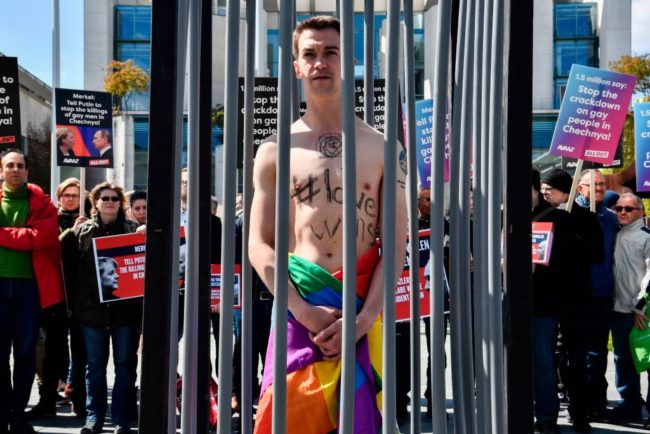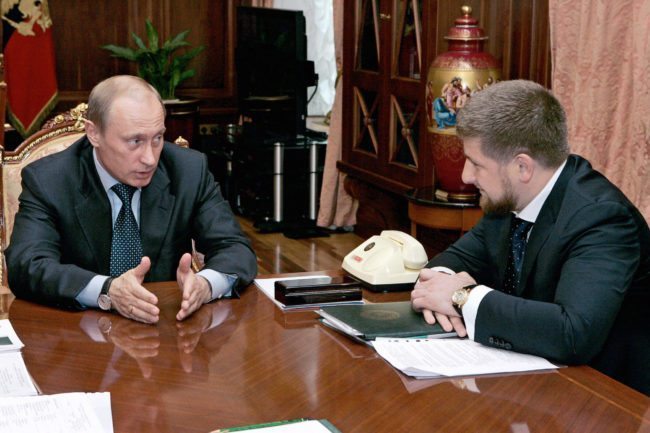‘They laughed when I cried’: victims of Chechnya’s gay purge open up about their horrific abuse

Activists protest the “gay genocide” in Chechnya (Getty Images)
The Russian LGBT Network has published a report documenting testimonies from people who have experienced persecution and abuse in Chechnya.
They have been collecting the stories as they work to help people in Chechnya who have, over the past five months, been subject to brutal abuse because of their sexuality
Related: Everything you need to know about Chechnya
The Russian LGBT Network launched a 24-hour hotline for those being persecuted in Chechnya, trying to assist them where possible, and has been able to help evacuate over 60 victims from the region.
The news of “gay concentration camps” in the Russian federal republic of Chechnya first reached the international press in April 2017.
It was reported that gay and bi men had been rounded up in a “purge” and were being abused, tortured and killed in the camps.
Despite international pressure, the report says that the camps are still in operation, and that it is likely dozens of men have been killed.

(Photo by JUSTIN TALLIS/AFP/Getty Images)
Before 2017, the LGBT Network said there were a number of cases from people who said their sexuality was used as a reason to abuse them and extort money from them.
One victim said: “They pulled me out of the car. Took off my clothes. My shirt, jeans, even my underwear.
“They themselves started to undress me. The one who was driving filmed all of it; the others just beat me.
“They did this to get money from me.”
But in 2017, these attacks became more focused, with police often using the justification of ‘random drug searches’ to target men they thought might be gay.
One man reported that his car was raided by the police for drugs. They saw he was wearing bracelets and had a bag containing toiletries and a manicure set, which was enough to make him a target.
They asked him: “Are you a faggot? If you are, I’ll shoot you right here.”
The report said the attackers were often driven by an ideology of “purification of the nation.”
One man said: “They openly told us: ‘You were brought here because you are faggots.
“‘You bring shame on our people; you shouldn’t exist. We will catch all of you.
“‘We will fight homosexuality in the Chechen Republic.'”
Another source said: “They threw me to the floor and beat me.
“They beat my chest and my face with their feet, and they hit my head against the floor.
“One of them said: ‘Do not beat him until the shock stage, at that point he will stop feeling pain. We don’t need that.’

(Getty)
“They addressed me with female pronouns and demanded that I tell them the names of other gay people I knew. They threatened to kill me if I didn’t.”
The report says that the first wave of attacks, which they pinpoint as beginning in December 2016, started when a man known as W was arrested and evidence of his homosexuality was found on his phone.
He was forced to give up names of other gay and bi men in Chechnya, who then became hate crime victims.
This began a pattern where the police would use the phones of men they had already caught to contact others. They would trick them into attending a meeting, at which the victims would be detained and incarcerated.
One man described how he received a phone call from a friend and went to meet him, but realised when he arrived that it was a set-up.
“The people who were with him were wearing camouflage uniforms. They said that they were taking me away. They started beating me up and saying humiliating things,” he recalled.
“They said that I’m not a man, just some creature, that I am nothing. That I should rather be a terrorist than a faggot. That a dirty piece of cloth was worth more than me.”
Some of the testimonies are even more horrific, describing in detail the physical abuse the men faced.
One source said: “They caught a guy, and he allegedly had contacts with terrorists. They brought in a hollow tube and a barbed wire.
“They put a tube inside of him. In his anus. Then, they put the barbed wire inside this tube. Then they took the tube out. And then they were slowly pulling the barbed wire out.
“We were led out into the hallway and chained to the power unit. We just sat on the cold floor all night long. Everyone passing by kicked us, spat on us, and insulted us,” one source said.

Russian President Vladimir Putin with Chechen leader Ramzan Kadyrov (Getty)
“The militants beat me using pipes, aiming below the waist: the hips and the buttocks. And from time to time, I was tortured with electric current. They used a casket with wires that had tweezers at the end.
“They attached those tweezers to my body. They laughed when I cried.”
Victims had no idea how long the detention would last, with some being held for as long as a month, and at least three people attempting suicide.
When released, the men were told that they could not flee Chechnya as their movements would be monitored.
They were also forced to take part in a “ceremonial shaming,” with families being told that if they murdered their “shameful” family member in an honour killing they would not be prosecuted.
A source said: “One day, when all of us were tortured, the head of the District Department of Domestic Affairs had a ‘conversation’ with us about the deadly sin of homosexuality.
“He said that we should be ashamed, and that we are a disgrace for such a proud nation. That there had never been such people among the Chechens.
“One of us said that there is no way we can change who we are, and he replied that they would continue their efforts to clear the Republic of such contamination.”
The report also talks about the violence against gay and bisexual women in Chechnya, something that has been less widely reported.
If outed, they would also often face violence from their relatives, who would not be prosecuted for abuse or murder.
One woman said: “I contacted my girlfriend … She said she was caught and tortured with
electric current by her brother.
“He also said that he would search for us through our network of friends, and that he would not rest before he executed all of us by shooting.”
She tried to flee Chechnya, but failed and was brought back home. She died a week later, officially from “complications after having the flu,” which the Russian LGBT Network understood to mean she was poisoned.
The organisation has corroborated these testimonies in the hope of highlighting the inhumane suffering which LGBT people in Chechnya are facing, and to show that these human rights violations can be traced to the most senior Chechen officials.
You can donate here to support the Russian LGBT Network’s efforts to help those persecuted in Chechnya.

